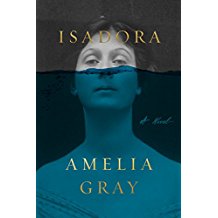
Isadora by Amelia Gray (2017. Audible. com. Audio book. ISBN 978-0374279981)
I picked up this audio version of Ms. Gray’s debut novel because of an excerpt and interview I read about the book on Lit Hub. Knowing nothing about the subject of the story’s focus, Isadora Duncan, a famed dancer from the early 20th century, and loving good literary fiction, I loaded the audio file into my phone and, over the course of several weeks, listened to the novel as I drove to and from work.
Here’s my take on the story arc. The tale starts off with steam: the deaths of Gray’s two young children and their nanny by drowning in Paris. The car they are in, having just left Isadora and her paramour, Paris Singer (yes, from the Singer sewing machine lineage and a wealthy man with a wife and daughters waiting for him back in the States) plunged into the Seine. All inside perished. The loss of the children, Deirdre (with Gordon Craig) and Patrick (with Singer) and the engaging personality of Isadora sets the stage for an intriguing exploration of this thoroughly independent and modern artist. Bisexual, impulsive, crass, and demanding, Gray’s Isadora has all the hallmarks of being the linchpin of an engaging historical novel. And yet…
After the deaths of the children, not much happens. There is no intensity, no drama, no conflict other than the internal discord Gray examines over and over and over again with respect to her muse. Instead of tension and intrigue and excitement, we follow the grief stricken Isadora in her first-person narrative, and three other supporting characters, including Isadora’s long-suffering sister and fellow dance teacher, Elizabeth (in third-person) throughout the year following the tragedy. Additionally, the endless discussions about, and descriptions of, various dance styles and routines and exercises and performances is just plain boring. Replicating dance in prose is difficult; perhaps impossible. Here, repetition of the modern dance theme, a key component of the narrative, becomes tired and pedestrian. The lengthy passages (page after page after page, it seemed!) detailing Isadora and Elizabeth’s artistry caused me to stare out the windshield of my Jeep and study the passing landscape rather than focus my attention on the story being told.
As the title to this review indicates, the writing, while reminiscent of Jane Austin at her best, and the author’s considerable intellect and love for the English language, were unable to overcome the structure of the book and the lack of any real conflict compelling a reader to remain engaged. I came away from listening to the book having little regard for any of the self-centered, spoiled, brats who populate Gray’s fictional landscape. The beginning was extremely promising. The ending? Equally so. The middle. Muddled and without purpose. I found, in the end, I just didn’t give a damn about what happened to Isadora or anyone else in the tale.
This is one of those revered modern literary novels that leaves me wondering whether reviewers actually read the entire book.
2 stars out of 5.
Peace.
Mark


